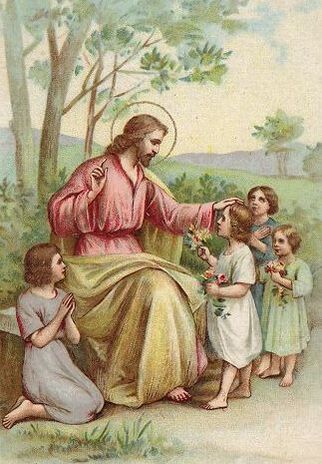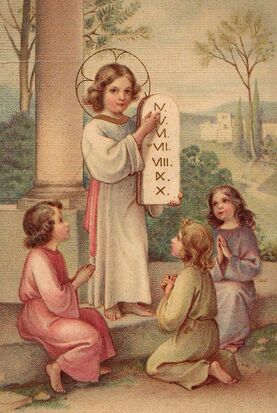Those who do not give their heart to God do not love Him. All those who are in mortal sin do not love God; they love their evil passions; they tell a direct lie to God as often as they say: "My God I love Thee" God is not satisfied with a divided heart; we must not divide our love between Him and His Creatures. To love with the whole heart means to love God alone, and everything besides God for God's sake and in such a manner as He wills.
St. Francs de Sales loved God with his whole heart, for he says of himself: "If I knew that there was in my heart a single fibre not for God, I would tear it out at once." If you have any inordinate love for any person of thing expel it from your heart, forr the heart man is a tabernacle in which God alone should dwell.
I heard a story the other day about a little boy who surely had the love of God in his heart. There is one thing he never forgot namely, to take his offering with him every Sunday to church. He had his envelope for his weekly offering just as his father had and he never would go to church unless he had it with him I happened one day that he had to go to church alone on a Sunday when his father and mother were absent. However, he did not go without his offering. He had it in his little white envelope which he carried in his pocket. That morning a strange lady sat at the head of the seat in the same pew, and when the time came for the offering to be given she looked in her bag and found that she had no money with her. She didn't seem to be troubled about it, but the little boy was greatly troubled and wondered what she would do when the men would come with the plates to receive the offering and she had none to give. You see he had formed the habit of giving and he enjoyed it, and wondered how anybody could go to church without a gift. Well, he got more troubled and anxious the nearer the ushers came with the collection-plates, and when they came to the seat in front of the one where he was sitting he held out his little white envelope to the strange lady, and said to her: "Here, please, take this and put it in the plate, and I'll get under the seat. I'm small and they won't see me." That boy has formed a habit of giving, and when he grows to be a man it will be part of his life and part of his religion to offer his gifts unto the Lord. I think that every boy, no matter how small, ought to give some of his money—however little it may be—to God.
Charity requires that we always will what God wills, that we make a sacrifice of our will to God, and therefore accept cheerfully all crosses and afflictions from His hand. In this way all pious souls manifest their love of God. When St. Gertrude said the "Our Father," she used to repeat three times the words "Thy will be done." While praying thus one day, our blessed Lord appeared to her, having health in one hand and sickness in the other, and said to her: "Choose, daughter, between health and sickness." Which do you suppose the saint chose? Health, of course. No. Well, then sickness ? No. As she did not know what our Lord thought good to give her, she said : "Lord, not my will but Thine be done." Let us be satisfied with whatever God is pleased to send us, firmly convinced that He will send us what is good for us.
In the year 1623, at the beginning of Lent, the Venerable Agnes of Jesus became very ill. She was at that time only twenty-one years old. The physicians did not seem to understand the nature of the malady, and gave her medicine which, instead of making her better, only made her suffer the more. But Agnes never uttered one word of complaint, the only words she said were the following, which she repeated often every day: "O my God, mayest Thou be blessed a thousand times." When Easter Sunday came, God was pleased to reward the patience with which she had suffered the heavy crosses He had been pleased to send her, by permitting her guardian angel to appear to her. "My child," said the angel, "are you happy in your sufferings?" "Yes," she answered, "because it is the holy Will of God, whom I love with all my heart. My heart and my will are entirely united to Him : let Him dispose of me according to His divine Will." The angel answered: "Continue to love Jesus in this way, and be assured that He will never forsake you."
When we love some one sincerely we often think of him, for where our treasure is there also is our heart. If, therefore, we truly love God, we shall frequently think of Him and raise our heart to Him. St. Aloysius was always occupied with the thought of God and divine things, and, whether alone or in company, whether he worked or rested, he had no room in his heart for anything but God.
To spare his weakened health, his superiors ordered him to turn his thoughts sometimes from God and to divert himself. But it was impossible for him to do so. Hence it is not a good sign that so many of us have our thoughts everywhere except with God; that we rise in the morning and lie down in the evening without thinking of God, that we occupy ourselves the whole day entirely with temporal affairs, without even a passing thought of God, that even when in church we give way to distractions, and that in general we care as little about God as about a stranger. If we feel ourselves guilty we must admit that our love of God resembles a weak spark which is liable every moment to be extinguished.
A father and mother were living with their two children on a desert island in the ocean, on which they had been shipwrecked. Roots and vegetables served them for food; a spring was their drink; and a cavern in the rock their dwelling. Storms and tempests often raged fearfully on the island. The children knew nothing of the vast continent; bread, milk, fruit, and whatever other luxury is obtainable there, were things unknown to them.
There landed one day upon the island four Moors in a small boat. The parents were greatly delighted, and hoped now to be rescued from their sufferings. But the boat was too small to take them all over together to the adjoining land, so the father determined to risk the passage first. The mother and children wept, when he embarked in the frail wooden boat, and the four black men were to take him away. But he said : "Weep not, it is a better land : and you will all follow soon." When the little boat returned, and took away the mother, the children wept still more. But she also said: "Weep not! In the better land we shall all meet again." At last came the boat to take away the two children. It was with fear and trembling that they drew near the land. But how delighted were they when their parents appeared on the shore, offered them their hands, led them into the shade of lofty palm trees, and regaled them with milk and honey. "My dear children," said the father, "our voyage from the desert island to this beautiful country has a higher meaning. We are all destined to make a much longer journey, to a much more beautiful country. The whole earth upon which we dwell resembles an island ; this glorious land is an image for us, although only a faint one, of heaven ; the voyage hither over the stormy sea is death ; that little boat resembles the bier, upon which men in black apparel shall sooner or later carry us forth.
But when the hour strikes for us, for myself, your mother, or you! to leave this world, be not afraid. Death is for pious people, who have loved God, and have done His will, nothing else but a voyage to the Better Land."
Children, whatever you do, do all for the love of God, that you may become richer and richer in merits in this world, and hereafter receive in heaven the reward of all that love God.
Source: Story Sermonettes for the Children's Mass, Imprimatur 1921




 RSS Feed
RSS Feed